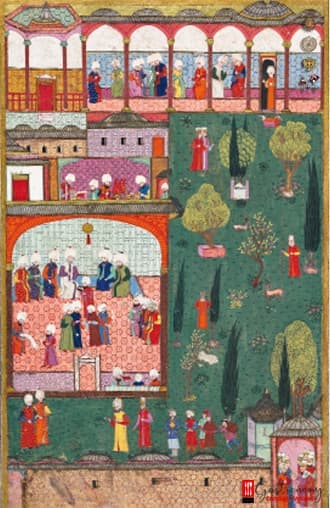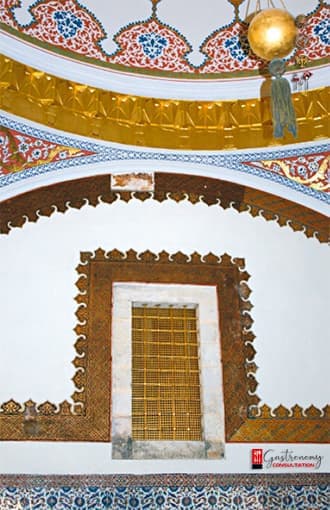On the day when the Divan would convene, at the time of the morning prayer, the janissary agha, the cavalry squadrons and some janissaries would take their places in front of the minaret of the Hagia Sophia Mosque on the side of the Bâb-ı Hümayun. The dignitaries who performed..
Divan-ı Hümayun Meetings and Ambassador Reception
Ahmet ONAL*
Divan-i Humayun, XVII. Until the middle of the century, it was the main place in the administration of state affairs in the
Ottoman Palace Cuisine Ottoman Empire. Although it gradually lost its weight in the administration from this date on, it was preserved until the last days of the empire as a strict and elaborate organization.
On the day when the Divan would convene, at the time of the morning prayer, the janissary agha, the cavalry squadrons and some janissaries would take their places in front of the minaret of the Hagia Sophia Mosque on the side of the Bâb-ı Hümayun. The dignitaries who performed their morning prayers in their mansions or generally in Hagia Sophia would also come here and settle in according to their positions.
The viziers, who came here last in order of rank from smallest to largest, would exchange greetings among themselves, while loud howling called "applause" was made. When the gathering was completed, the challenger prayed loudly, and after the Fatiha, which was read together, the door of the palace was opened, and everyone began to enter in the order of attendance.

4- Divan-ı Hümayun meeting (Ârifî, Süleymanname)
Divan-ı Hümayun Meetings and Ambassador Reception
The gunners, treasurers and kadiaskers in the first group would go to Kubbealtı, not go inside and wait for the viziers to come. From Ortakapı onwards, although the second vizier was at their head, the sergeant and the janitors would enter the Divanhane with the participation of the viziers who came from the back, accompanied by the sergeant and the janitors, and everyone would take their place and wait for the grand vizier to arrive. In the meantime, ice sherbet or paste was offered to those in Divanhane, depending on the season.
When the Grand Vizier was informed that the members of the Divan were waiting for him, he would come to the palace with his entourage and dismount in front of Ortakapı. Because no one other than the sultan could enter this gate on a horse.
When the news that the grand vizier had arrived in Ortakapı, the people in Divanhane would go out and line up in two rows. After the Grand Vizier greeted Babüssaade, he would return and greet those who were waiting for him, and enter the Divanhane, and the others would follow him.
Everyone would stand up and sit down after the grand vizier broke the seal of the treasury delivered to him. Two officers would start reading the Surah of Conquest in front of the treasury, and as a token of the satisfaction of the soldiers of the hearth warden, Kapikulu would offer hard candy to the dignitaries. Soup was distributed to the Janissaries at the end of the Surah.
The Janissaries' refusal to accept the soup was a sign of rebellion, and this news immediately spilled over from the palace walls to the streets of Istanbul, arousing great fear in the people. If such an event does not occur, the usual preparations will continue, and the treasury and the ledger will be removed.
The notebooks to be used that day were brought to Divanhane. Reisülküttab leaving the diagnostic bag on the left side of the grand vizier; The preparations would end when the divitdar lord came to the grand vizier with a towel and came to the divan and put money in a purse to be given to the Muslims and the poor. Finally, the meeting would begin with the sergeant's head striking the ground.
The meeting, which usually lasted until noon, ended with the sergeant-chief agha striking his staff on the ground. A table was set in front of the grand vizier, the viziers and the kadiaskers in the Divanhane. If the envoy's entourage was crowded in the councils where ambassadors were accepted, separate tables were set for the gunner and the treasurer, and the members of the embassy delegation were distributed to these five tables according to their reputations.

5- The cage where the sultan followed the meetings of the Divan-ı Hümayun
Separate tables were not set for the officials serving in the divan, they ate from the food on the tables that were in front of the high state. At the same time, food was given to the people who came to the divan for an issue. Meals were eaten on the day of the offering, after the recitation of the calligraphy of the sultan's permission for the offering, and the divan and the ulufe divan after the distribution of the ulufes.
When the meal was over, if it was not the day of the offering and if it was deemed necessary, the divan would continue for a while, and the meeting would come to an end when there were no issues to be discussed.
First of all, the janissary agha and the head of the division would leave the square, and then the kadiaskers would leave the court. The sergeant would take the seal from the grand vizier, seal the treasury and the ledger, then bring it back and return it. Everyone stood up as the seal was exchanged.
Afterwards, the grand vizier would come out of the Divanhane and greet Babüssaade, while the viziers would go out and get on their horses in Ortakapı and go to the salute in front of the Bâb-ı Hümayun.
The Grand Vizier would pass in front of them, saluting each vizier, and they would disperse after greeting each other in turn. If the land was to be entered, the janissary agha, kadiaskers and viziers would go before the sultan and disperse after him.
The Divan-ı Hümayun convened every three months to distribute the ulufe to the Kapıkulu, this was called the "Divan of the Great". On that day, while the negotiations were going on in Divanhane, on the other hand, the honours to be distributed to the janissaries were brought here in bags.
When these were completed, the grand vizier would send a compliment to the sultan and ask for permission to distribute the ulufe, and with the permission of the sultan, the distribution work would begin.
6- Grand Vizier Nevşehirli Damat İbrahim Pasha giving a banquet to Dutch Ambassador Calkoen at the Divan (Vanmour)
Before the ulufe was distributed, it was customary to give soup, rice and zerde from the palace kitchens to the janissaries, and only cold cuts if it is Ramadan. Meals were left in front of Babüssaade, and the Janissaries waiting at Ortakapı would run together to get their meals and eat in the courtyard, with the signal given by the sergeant major with the skirt of his dress. After the meal, they would gather again in front of Ortakapı. The sergeant major here makes a loud gulbank, finally saying, "Let's say Hu!" when he said it, all the janissaries would also shout hu in unison. Thus, the distribution of ulufe was started.
When the ambassadors who came to Istanbul were to appear for the first time, they were first taken to Kubbealtı and then to Arzodası in the palace. The council established for the reception of the ambassadors was called the "ambassador's council". Envoys were invited to the Divan-ı Hümayun on the days of submission to present the names of their rulers.
Grand Vizier Nevşehirli Damat İbrahim Pasha giving a banquet to Dutch Ambassador Calkoen at the Divan (Vanmour)
they were made. However, if there was no emergency, the ambassadors were usually accepted to the ulufe council, so that they were shown the magnificence of the Ottoman Empire. The divans, which were both distributed to the ulufe and accepted as ambassadors, were called "great divan" or "conqueror divan".
Due to this ceremony, the places that the ambassador would visit and see, especially in Kubbealtı and Arzodası, were decorated with carpets, precious goods and jewels. If the ambassador's residence was in Istanbul, horses and some sergeants were sent to his mansion in Galata, to Bahçekapı Pier to bring him and his entourage to the palace. The ambassador, who reached the palace by passing in front of the Regimental Mansion, was dismounted at Ortakapı, rested for a while in the headmasters' room, and was taken to the Second Courtyard and taken to Kubbealtı while the janissaries were going to run for rice and zerde.
If it was a non-Muslim ambassador, the grand vizier would go to the Divit Room before the ambassador entered the Divanhane, in order not to stand up, and the grand vizier would come as soon as the ambassador entered.
When the Grand Vizier entered, the dignitaries stood up, in this case the ambassador thought that he was standing up out of respect for his own state, while those in the divan would consider themselves to have stood up for the grand vizier. This method was not used for the ambassadors of Muslim states, the grand vizier would wait in Divanhane, and everyone would stand up when the ambassador entered. When the distribution of ulufe was finished, the ambassador himself ate at the table of the grand vizier and his entourage ate at the table of others. After the meal, preparations were made for the ambassador to be brought before the sultan in Arzodası.
7- II. Osman's departure from Istanbul with Sancak-ı Şerif for the Hotin expedition (Nâdirî, Şehnâme)
They would also leave the sofa. The sergeant receives the seal from the grand vizier, the treasury and the depository
In the acceptance of the ambassador, the order in the normal offering days was followed. The ambassador was kept in Babüssaade until the janissary agha and kadiaskers left the earth, and he and his entourage were dressed in hilats. When it was the turn of the viziers to present, two doormen would take the arms of the ambassador and those with him, and in this way, they would be taken to the Arzodası and bowed in front of the sultan. In order for the ambassador to be admitted to the presence, it was necessary for the ruler to bring names and gifts addressed to the sultan.
The name, which the ambassador handed over to the miralem aghas, was handed over to the grand vizier by the viziers in order from smallest to largest, and he would leave it on the mat next to the sultan. The sultan's name was conveyed to the ambassador in the same way. If the sultan had something to say to the ambassador, he would address the grand vizier directly, if he would not speak, he would signal and the ambassador would be taken out.